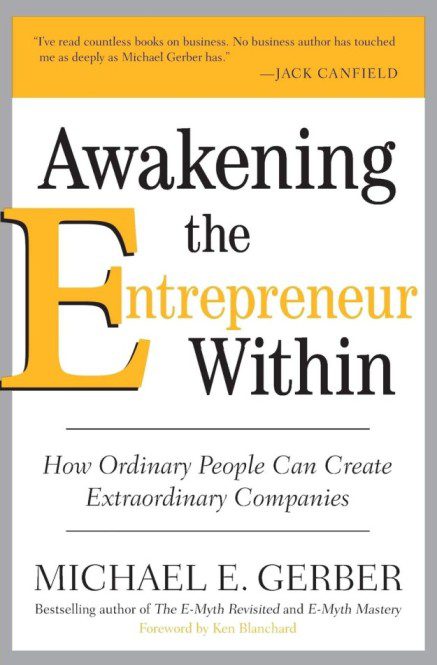Print | Kindle(eBook) | Audiobook
Author and founder of E-Myth Worldwide, Michael E. Gerber, shares with the readers how to go from dreaming about owning a business to actually owning it by Awakening the Entrepreneur within them. Michael E. Gerber is the author of the NY Times bestseller “The E-Myth Revisited” and nine other worldwide best-selling E-Myth books concerning small business entrepreneurship, leadership, and management.
Here are my favorite takeaways from reading, Awakening the Entrepreneur Within by Michael E. Gerber:
The Fatal Assumption
By believing that running a business is all about work, most small businesses don’t work; the people who start, run, and attempt to succeed in them, do work hard but fail.
The Sudden Seeing
The sudden seeing is the epiphany that happens when in one inscrutable, revelatory instant, the world reveals its secrets to you. That is a rare and indelible moment indeed. It is there in that lucid moment of clarity that the entrepreneur is provided with a rare glimpse inside a mystery, which is what a business is. It is a mystery in which people, processes, systems, ideas and facts, customers, investors, technology, and an overriding single-minded purpose come together to produce an original result that people love to produce inside the company and that people love to buy outside of the company.
The Five Realities of the Entrepreneur
REALITY #1
An entrepreneur is an inventor, although few inventors are entrepreneurs. An inventor sees the world through alert, wide-open eyes. An inventor lives asking the question, “What’s missing in this picture?” and then answers it by inventing the missing piece that makes the picture whole. He can’t help himself, it’s just what he is called to do. What an entrepreneur does next, however, is what makes the difference between him and all other inventors.
REALITY #2
Entrepreneurs do not buy business opportunities; they create them. While business opportunities such as franchises are more likely to guarantee the success of the person who buys them, they are only successful to the degree the buyer suppresses his or her inclination to invent—suppresses his or her entrepreneurial passion. Therefore, entrepreneurs who buy business opportunities are doomed to disappointment, no matter how successful the business is. The passion of the entrepreneur is not to run a successful business—not to run a business someone else invented—but to invent a unique business that becomes successful.
REALITY #3
Invention is contagious. People love to experience an original business idea that has been successfully manifested in the world. So, the entrepreneur’s passion comes not only from inventing a new business but also from basking in the delight of other people as they gladly experience his or her invention. The entrepreneur, in this sense, is no different from a performer whose love for what he or she does is dramatically increased by the enthusiastic response from the audience.
REALITY #4
To an entrepreneur, the success of the invention—the business—is measured by growth. The faster the business grows, the more successful is the invention. The slower the business grows, the less successful is the invention. To an entrepreneur, slow growth or no growth is death. To be caught up in a slow- or no-growth business is to be doomed to show up every day to perform in a show nobody enjoys. On Broadway, shows that nobody enjoys close quickly. Businesses that nobody enjoys should close quickly so that everyone can go out looking for an experience they love.
REALITY #5
Everyone possesses the ability to be an entrepreneur—to invent, to conceive of a great idea for a new business, and to create an original business based upon a simple but explosive idea. For some of us it may take longer to develop that ability, it may take more work. For others it may take little more than the awareness of what differentiates the entrepreneur from the manager and the technician to set off a flood of entrepreneurial excitement. In either case, however, it is necessary for each of us to know that learning to invent, to create, to conceive of an original business is both a process of discovery and the development of the patience necessary to sustain one’s interest while developing one’s skill.
Entrepreneurs are made, not born. There is no corner on creativity. There is simply the desire to express it. Once that desire appears, you can be assured that you have awakened the entrepreneur within. The very presence of that desire means that the entrepreneur is up and dreaming.
Four dimensions of the entrepreneurial personality:
There are four dimensions of the entrepreneurial personality that come into play in the creation of a new venture: the Dreamer, the Thinker, the Storyteller, and the Leader.
THE DREAMER
Surprisingly, the Dreamer is the least known and understood personality within the entrepreneur. You would think it would be exactly the opposite. Everyone knows that entrepreneurs dream, but few people truly know what it means to dream. They think of dreaming as daydreaming, as wishful thinking.
THE THINKER
The Thinker is the Dreamer’s most important companion, his most important ally. He listens carefully to the Dreamer’s thoughts, and knows that without the special role he plays in the manifestation of the Dreamer’s vision, the Dreamer would be lost. The Thinker asks the questions essential to formulating the business model—the form the Dream will take visually, emotionally, functionally, and financially—as well as the impact the Dream will have on its customers, its investors, its employees, its suppliers, and its strategic partners.
THE STORYTELLER
The Storyteller could be called by his other name, the Performer. He is the one who evokes excitement when the Dream is conveyed to other people. The Storyteller knows that without a compelling story, no Dream would become a reality in the world of ordinary people in which the Dream is intended to manifest itself as a striking reality. The Storyteller knows that without a compelling story, no Dream would ever become a reality. The Storyteller digs deeply into the Dreamer’s Vision and the Thinker’s formulation of that Vision, and looks for the creative arc that lies at the heart of every great story.
THE LEADER
The Leader is the one who assumes responsibility for moving the Dream forward, takes accountability for fulfilling the Dream, for knowing where he is going, how he is going to get there, when he’s going to get there, and what the venture will look like when it gets there. The Leader takes on the Vision and the formulation of the enterprise. The Leader knows the Story, buys the Story, lives the Story, is committed to the Story, and tells the Story in concrete terms that are evidence of the fact that the Story is more than just a story but rather a tangible reality that can be lived and experienced.
The Awakening
The Awakening is the flashpoint where the entrepreneur within comes awake with the sudden seeing of an opportunity that he had never seen before. It’s as if he were hibernating until that auspicious moment, waiting silently for something to occur, when, for reasons unknown to him, something says, “Wake up!” and he does, hungry as a bear coming out of a long winter’s sleep to eat his fill of all these extraordinary and luscious new foods that are beckoning him.
The greatest crisis of our lives is neither economic, intellectual, nor even what we usually call religious. It is a crisis of imagination. We get stuck on our paths because we are unable to reimagine our lives differently from what they are right now. We hold on desperately to the status quo, afraid that if we let go, we will be swept away by the torrential undercurrents of our emptiness. —Marc Gafni, The Mystery of Love
The Personal Dream
There are many kinds of dreams. There is the dream of the lonely man or woman, there is the dream of the lustful lover, there is the dream of the old man wishing to become young, of the young man wishing to be older, of the spinster wishing for a companion, of the companion wishing for a lover. There is the dream of the “D” student wishing for good grades, of the single mother wishing her son would get a job, of the plain woman wishing for beauty.
All of these dreams are what can be called “personal dreams.” They, and so many more just like them, from the sublime to the absurd, from the realistic to the fantastic, are what consume most people most of the time. For most of us, they remain dreams of longing, of personal desire.
The Impersonal Dream
It is anything but personal. It is not about you and it is not about me. It is about the act of creativity, about that “sudden seeing” of a possibility we have never seen before, when we suddenly become aware, intensely aware, of some condition, some reality, some frozen particle of time and space that is just dying to be fixed, or changed, or reinvented, or transformed.
All the Best in your quest to get Better. Don’t Settle: Live with Passion.



1 Comment
Pingback: 50 Audiobooks Listening Challenge 2021. – Lanre Dahunsi